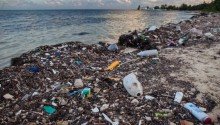Recent reports suggest there are more pieces of plastic in the world’s oceans than fish. That’s because large pieces of plastic waste debris from fishing, beaches, rivers & shipping break-up rather than break-down in the natural environment. Simply speaking one piece of plastic can become hundreds nay thousands even millions of smaller pieces called microplastics.
Floating plastic waste including microplastics accumulate in naturally occurring Gyres formed by ocean currents and winds. These ‘islands’ of plastic waste can be the size of countries yet very little has been known about them until recently. An island is not really an accurate description as there is no solid mass nor does it stay in one place. It is more akin to a ‘plastic soup’. BUT who is responsible for cleaning-up this mess – nobody knows?
A Plastic Ocean is the result of four years investigative film-making. A multi-disciplinary quest by the Plastic Ocean Foundation to document and explain the scope and scale of the problem. Parts of the film also look at land-based plastics, their use, toxicity and effects on human health. What they have discovered is a toxic legacy which cannot be solved in a generation or two but will take centuries to undo if it can be undone at-all.
In a scenario that is all-to-familiar to environmentalists trying to combat climate change through a reduction in fossil fuels. Plastics are ubiquitous, their use is increasing fuelled by global demand and supplied by an industry with no interest in reducing the amount of product that comes to market. Recycling, we are told, is not the answer as it represents only a tiny proportion of the total amount of plastics in circulation and the rest is due to accumulate.
This accumulation of plastic waste in the marine environment is entering the food chain at ALL levels. From microscopic organisms to gigantic blue whales and that means you too ‘if it’s in the food chain for the dolphin it’s also in humans’. But perhaps surprisingly it’s not the human suffering that causes the viewer the most discomfort. It’s the distressing scenes of wildlife; a beached whale dies after ingesting a plastic sheet, seabird chicks die of malnutrition, stomachs full of plastic and too heavy to ever fly.
After dealing with the largely physical effects of plastic accumulation the film goes on to explain disturbing side-effects associated with chemicals used in plastic. These chemicals known as Endocrine Disruptors also make their way into ‘consumers’ be they marine or human through the accumulation of plastic products and waste. I am not going to go into this is any detail here as Wikipedia does a pretty good job.
The Plastic Ocean Foundation have thoughtfully released a high-level scientific report backing-up their claims made in the film. There are a lot of facts and figures in this film however some of these facts and figures are displayed in Kilograms and Lbs whereas others are only displayed in Lbs which is a bit confusing for us Europeans / non-US audiences.
A Plastic Ocean film represents the tip-of-the-iceberg when it comes to actually doing something about this problem. As mentioned earlier the Gyres and floating ‘islands’ are a fairly new phenomena and no governing body wants to take responsibility for clearing-up the mess. There are very few ‘solutions’ on offer here other than to refuse disposable plastics and dispose of your own waste responsibly. I would also like to add joining or organsing a beach clean-up operation will remove plastics that would otherwise find it’s way back into the sea.
Should all plastics be deemed a hazardous waste? That’s the feeling many are left with after seeing the film A Plastic Ocean.
Lee Hadaway
For Screenings in UK and Beyond







